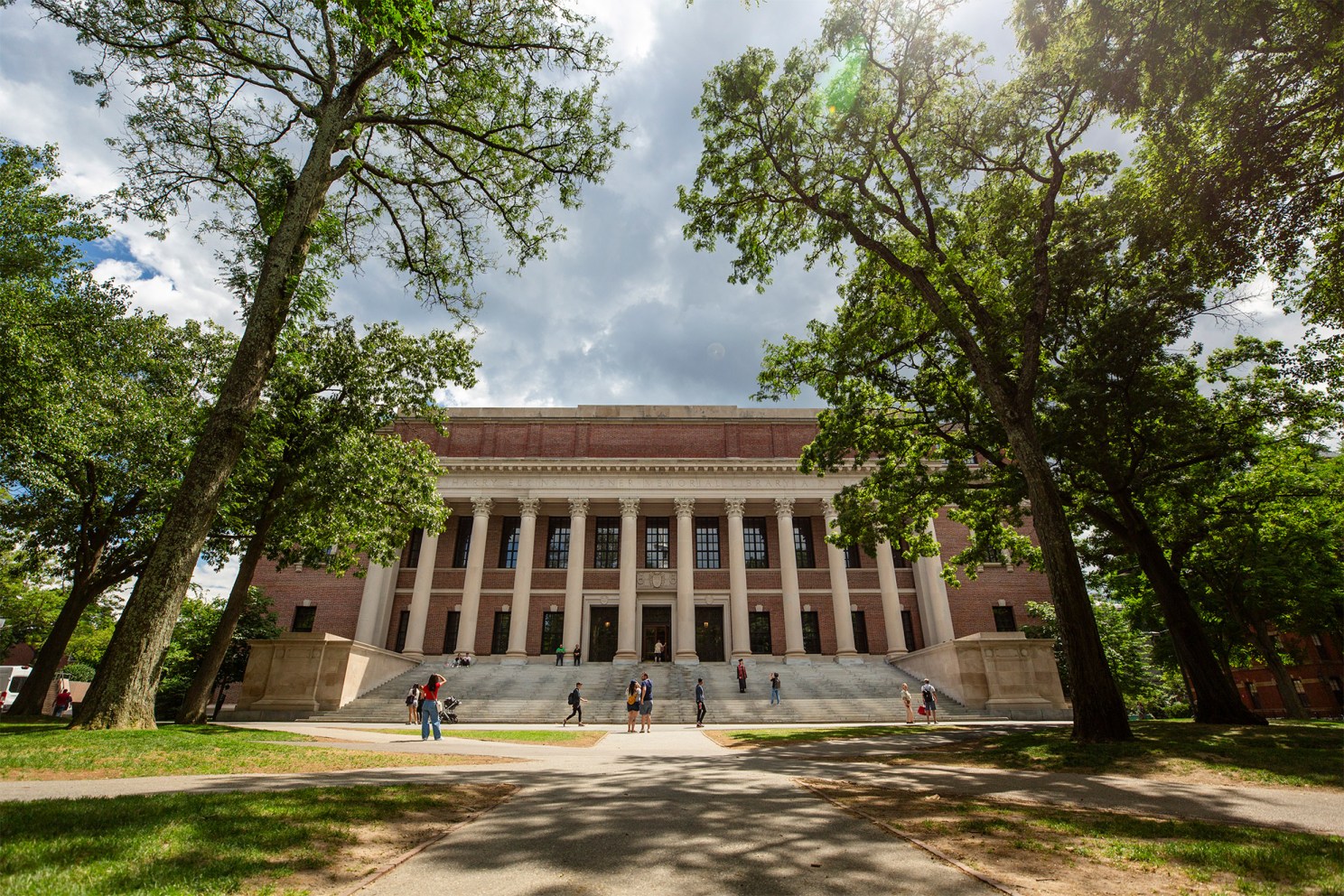Harvard files lawsuit against Trump administration

Photo by Grace DuVal
Filing argues freeze of research funding violates First Amendment, laws, procedures
Harvard filed a lawsuit Monday against the Trump administration, arguing its freeze on research funding is unconstitutional and “flatly unlawful” and calling on the court to restore more than $2.2 billion in research dollars.
The filing, in U.S. District Court in Boston, requests that the court vacate and set aside the funding freeze to allow previously approved funding to flow and halt administration efforts to freeze current or deny future funding without engaging in procedures contained in federal law.
In a message to the community Monday, President Alan Garber said the suit was prompted by steps the government took over the last week, after the University rejected administration demands for changes to Harvard’s governance, hiring, and admissions policies, and to ensure “viewpoint diversity” in part through audits of viewpoints of students, faculty, and staff.
Garber described those changes — contained in an April 11 letter from the government — as intrusive and said they’d impose “unprecedented and improper control over the University.”
Garber noted some Trump administration representatives have said since April 11 that the letter was sent by mistake. But he said other statements and the administration’s actions since don’t bear that out.
Within hours of Harvard’s rejection of White House demands, the administration doubled down by announcing a freeze of $2.2 billion in funding and has since said it is considering revoking Harvard’s tax-exempt status and threatening the education of international students. In addition, Garber said, the administration is considering freezing an additional $1 billion in funding.
“Moments ago, we filed a lawsuit to halt the funding freeze because it is unlawful and beyond the government’s authority,” Garber said. “Before taking punitive action, the law requires that the federal government engage with us about the ways we are fighting and will continue to fight antisemitism. Instead, the government’s April 11 demands seek to control whom we hire and what we teach.”
Harvard’s complaint says the First Amendment protects free speech against government interference intended to enforce ideological balance and bars the government from using legal sanctions or other coercion to suppress speech it doesn’t like.
The complaint also describes the government’s freeze-first strategy as violating laws that lay out procedures for research fund recipients suspected of civil rights violations. Prescribed steps progress from voluntary negotiations to an official hearing followed by findings. Then, only 30 days after the findings are released can funding be terminated.
“These fatal procedural shortcomings are compounded by the arbitrary and capricious nature of Defendants’ abrupt and indiscriminate decision,” the lawsuit said.
The filing describes a rapid escalation on the part of the government. After initial inquiries in February from the administration’s multi-agency Task Force to Combat Antisemitism, administration and University officials scheduled an official visit to campus in late April.
In late March, however, Harvard received a letter announcing a review of research grants totaling $8.7 billion to the University and its hospital affiliates. On April 3, Harvard received a list of conditions under which it might ensure continued funding and, finally, on April 11, a letter fleshed out those conditions.
Those details, which included overreaching and broad-ranging demands, prompted the University’s rejection and Garber’s statement that Harvard would not negotiate over either its independence or its constitutional rights.
Garber said the administration’s actions have jeopardized critical research being conducted on cancer, infectious disease, and battlefield injuries.
With funding in flux, the lawsuit says, hard decisions about things like living cell lines being used to investigate disease and the jobs of researchers whose positions are tied to federal grants will have to be made. Unless funding is restored, Harvard’s research programs will be considerably curtailed.
“The consequences of the government’s overreach will be severe and long-lasting,” Garber said. “Indiscriminately slashing medical, scientific, and technological research undermines the nation’s ability to save American lives, foster American success, and maintain America’s position as a global leader in innovation.”
Garber acknowledged that work to fight antisemitism remains to be done on campus. “We need to ensure that the University lives up to its ideals,” he said.
Though Harvard has already taken several steps in that direction, Garber said the Task Force on Combating Antisemitism and Anti-Israeli Bias and the Task Force on Combating Anti-Muslim, Anti-Arab, and Anti-Palestinian Bias will soon release full reports.
He described them as “hard-hitting and painful” and said they include recommendations that have concrete plans for implementation.
“As a Jew and an American, I know very well that there are valid concerns about rising antisemitism. To address it effectively requires understanding, intention, and vigilance,” Garber said. “Harvard takes that work seriously. We will continue to fight hate with the urgency it demands as we fully comply with our obligations under the law. That is not only our legal responsibility, it is our moral imperative.”





